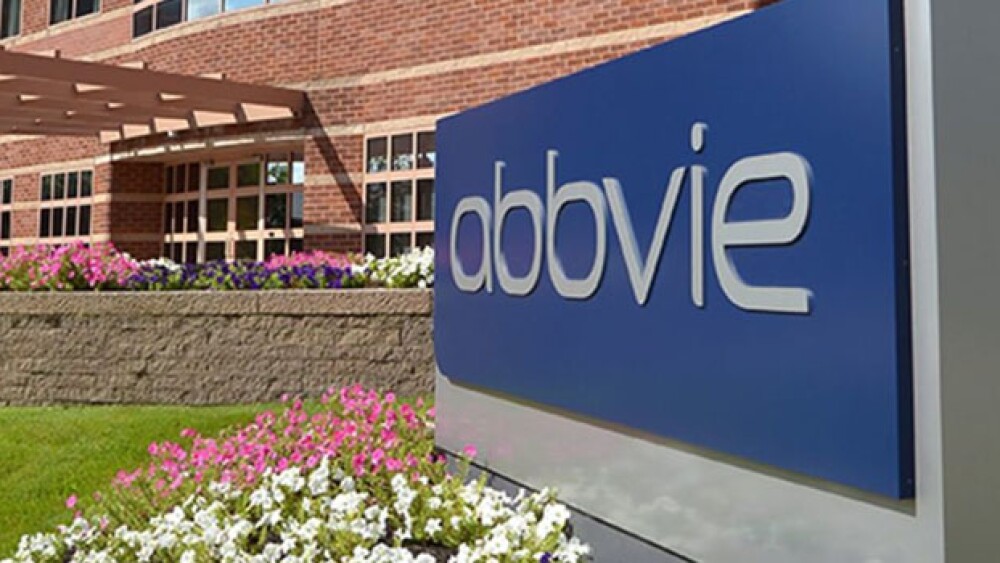Chicago-based AbbVie just announced new data for its Mavyret (glecaprevir/pibrentasvir), a pan-genotypic treatment for chronic HCV in treatment-naive patients with compensated cirrhosis.
The hepatitis C (HCV) market is increasingly a strange one—with the newest drugs actually curing the disease. The biggest player is Gilead Sciences, but it’s been noted that its drugs for HCV are so effective, they’re basically curing the disease, causing there to be a smaller and smaller patient pool to draw on. However, AbbVie’s Mavyret appears to be overtaking Gilead’s HCV drugs in the market.
Chicago-based AbbVie just announced new data for its Mavyret (glecaprevir/pibrentasvir), a pan-genotypic treatment for chronic HCV in treatment-naive patients with compensated cirrhosis. In the Phase IIIb EXPEDITION-8 trial, patients receiving the drug for 8 weeks who had genotype 1, 2, 4, 5 and 6 showed a 100-percent sustained virologic response 12 weeks after treatment.
The word “cure” is defined as achieving a sustained virologic response at 12 weeks after treatment.
“Current guidelines recommend a 12-week pan-genotypic regimen for people who have hepatitis C, are treatment-naïve and have compensated cirrhosis,” stated Robert S. Brown, Jr., the Gladys and Roland Harriman professor of medicine at Weill Cornell Medical College. “We are interested in investigating shorter treatment options, which may simplify care for patients with compensated cirrhosis while providing high cure rates.”
EXPEDITION-8 is an ongoing multicenter Phase IIIb clinical trial evaluating Mavyret in treatment-naïve genotype 1 through 6 chronic HCV patients with compensated cirrhosis. There are two cohorts of patients. One cohort has genotype 1 through 6, while the second cohort has only treatment-naïve genotype 3 patients.
The primary endpoint is the percentage of patients achieving sustained virologic response 12 weeks after treatment. Secondary endpoints are on-treatment virologic failure and relapse rates.
“Mavyret is already having a significant impact on people living with HCV,” stated Janet Hammond, AbbVie’s president, infectious diseases development. “However, there are still groups of patients who may benefit from a shorter treatment option. We continue to investigate and understand the value of an 8-week treatment regimen for patients, something we recognize as an important step towards HCV elimination.”
The company also announced it had signed a deal with the Medicines Patent Pool to increase access to the drug in almost 100 low- and middle-income countries (LMICs) and territories.
This is a royalty-free license that lets generic drug makers develop and produce inexpensive versions of the drug for market distribution in markets like Vietnam, South Africa, Pakistan and Egypt.
The deal was launched at the American Association for the Study of Liver Diseases (AASLD) The Liver Meeting 2018 held in San Francisco.
“G/P is a priority therapy for licensing for the MPP, so this agreement with AbbVie is very good news for public health,” said Marie-Paulse Kieny, chair of the MPP Governance Board, in a statement. “It is a really important new option for a significant proportion of HCV patients throughout the world. As with previous MPP licenses, we look forward to facilitating access to generic versions of this product as quickly as possible in as many territories as possible.”
Worldwide, there are about 71 million people with chronic HCV. Many of them are in LMICs. But at the end of 2015, only about 20 percent had been diagnosed and only 7 percent had received treatment.
Mavyret, or G/P as the Medicines Patent Pool refers to it, was approved in 2017. It is an oral, once-daily, pan-genotypic combination regimen with a high cure rate. The World Health Organization (WHO) has recommended it as a first-line treatment for eight weeks in treatment-naïve non-cirrhotic patients. Treatment-naive patients with compensated liver cirrhosis need a 12-week course of treatment.
Mavyret, according to the Medicines Patent Pool, is also indicated for HCV patients with a degree of renal impairment, including patients on kidney dialysis.
The Medicines Patent Pool also has existing collaborations in place with AbbVie, including two for HIV. One of those was signed in November 2014 for pediatric formulations of Kaletra (lopinavir/ritonavir), and the second was in December 2015 for the same combination drug in adults for use in Africa.
Gottfried Hirnschall, director of the Department of HIV and Global Hepatitis Programme for the World Health Organization stated, “The new agreement is an important step towards achieving elimination of hepatitis C worldwide. We urge national governments to take action now to make such curative treatments available for the millions of people in need.”





